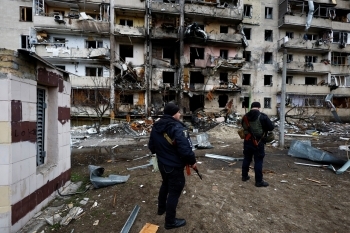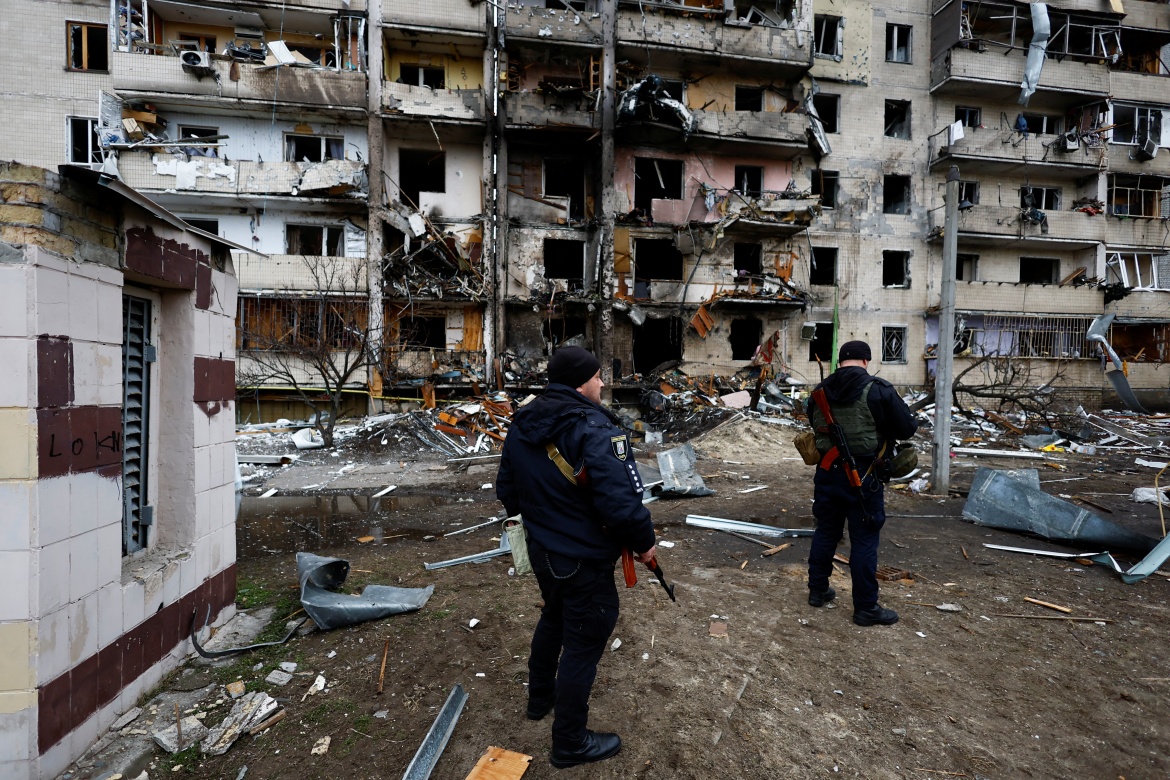
.png) Cedric Prakash
Cedric Prakash

The world is at war once again. The Russian invasion of Ukraine continues unabated. Several of the world’s democracies are with Ukraine; some big names like China are with Russia. Then there are fence-sitters like India – who blow hot and blow cold as per their convenience and interests. There are those who sit on the side-lines waiting for another global tragedy to unfold, thinking that they will not be affected. The industrial-military complex, mainly US-based, are all excited. Finally, their ‘bloody’ profits show a huge upward swing.
The arms and ammunition industry would have to close down if there is no war.
In 1869 (translated into English only in 1899) the renowned Russian writer Leo Tolstoy publish his magnum opus ‘War and Peace’. This massive work is philosophical, spiritual – but also deals with real war. Tolstoy highlights the situation of those affected by war and why peace is a non-negotiable for all.
More than 128 years after it was first premiered on 21April 1894, ‘Arms and the Man’, written by the celebrated Irish playwright George Bernard Shaw, is a comedy which needs re-visiting, in the context of the war and violence which has engulfed our world today. ‘Arms and the Man’ though a humorous play, highlights the futility of war and simultaneously exposes the hypocrisies of human nature. Shaw situated the play in the Serbo-Bulgarian war of 1885, with a Swiss mercenary soldier Captain Bluntschli as the hero. The play dances around two romantic encounters, but it is ultimately Bluntschli’s hitting remarks about war and soldiers “nine soldiers out of ten are born fools” and “I use my ammunition pouches to carry chocolates and not cartridges for my pistol” that hold sway. Writing fifty years later, well-known British novelist George Orwell wrote that, “the moral of the play that war should be abhorred, -- for it is not a wonderful, romantic adventure -- needs to be told!”
Prophetic indeed! The only difference today is that both ‘arms’ and ‘men’ are no longer subjects of a comedy on stage, but a terrible tragedy that unfolds daily in the lives of millions of ordinary people as it is doing today in Ukraine. Playing stellar roles in this tragedy are the ‘arms and ammunition’ industry and the ‘men’ (the mercenaries) who control and profit from an industry that has never had it as good as it is today.
Several nations (at the cost of social expenditure) spend an impressive quantum of money on their defence militaries. From tanks, aircraft carriers, personnel costs and other pieces of equipment, running an organised armed force is expensive. While the United States of America still outspends every other country in the world by a large margin, other countries have started to spend more money on their military expenditure as well. Established in 1966, The Stockholm International Peace Research Institute (www.sipri.org) is a global and highly respected independent think tank ‘dedicated to research into conflict, armaments, arms control and disarmament.’ SIPRI’s annual ‘Yearbook’ and the slew of well-researched documents produced by it provide one with the naked truth of today’s wars and how certain segments of society literally thrive from the wages of war.
The last annual report ‘SIPRI Military Expenditure Database’ was published in end-April 2021. As per the report, the top five biggest spenders in 2020 were the United States ($778 billion), China ($252 billion), India ($72.9 billion), Russia ($61.7 billion) and the United Kingdom ($59.2 billion) respectively. These five nations together accounted for 62 per cent of global military expenditure. Globally, the military spending in 2020 rose to $1981 billion. This value is an increase of 2.6 per cent in real terms as compared to 2019. India has the ignominy of continuing to be the third biggest military spender in the world in 2020, according to the latest data from SIPRI. This is a crying shame and a scandal of the highest proportion for a country which today has millions of people living on or below the poverty; where millions go to bed without a square meal, have no access to primary health care or elementary education, leave alone safe drinking water or a house of their own.
Today billions are allocated for the production of weapons – particularly weapons of mass destruction and their application. Spending patterns in India and in most countries need to change in order to eradicate poverty, which is a major threat to world peace and human life. From the earliest days of his pontificate Pope Francis has taken on the arms trade referring to it as the ‘industry of death’. On 23 September 2015, addressing the US Congress, he did not mince words saying “why are deadly weapons being sold to those who plan to inflict untold suffering on individuals and society? Sadly, the answer, as we all know, is simply for money: money that is drenched in blood, often innocent blood. In the face of this shameful and culpable silence, it is our duty to confront the problem and to stop the arms trade.”
On 16 April 2016, from the Greek island of Lesbos, Pope Francis challenged those who control the lives and destinies of others saying, “it is necessary, above all, to build peace where war has brought destruction and death, and to stop this scourge from spreading. To do this, resolute efforts must be made to counter the arms trade and arms trafficking, and the often-hidden machinations associated with them; those who carry out acts of hatred and violence must be denied all means of support.” A few months ago, on 5 December 2021 on his second visit to Lesbos, he voiced similar sentiments referring to the plight of the refugees and the displaced as “the shipwreck of civilization.”
The fact is when ‘war’ is good business, no one would like to take on the arms industry. It is common knowledge that whether in the yesteryears of the previous Governments or the one of today, ‘kickbacks’ is what those in power look forward to. Corruption is mainstreamed in this industry. It is not a state ‘secret’ that the arms trade has been bank-rolling powerful politicians from across the political divide.
Mercenaries play an important role in the trade. These are men anointed and protected by their governments who have no qualms in selling the most sophisticated weaponry to the devil. No one raises the sensitive issue of how much of the deadly weapons used by the ISIS have been manufactured by western nations.
The toy industry is another booming one, with guns, violent video games and other imitations of war weaponry topping the list. Parents do not think twice about gifting such ‘toys’ to their children for their birthdays or first communion and even on Christmas. The long-term impact is never considered. So naturally everybody is ‘shocked’ when a teenager takes a real gun and mows down his fellow-students and teachers! Peace and non-violence are fundamental to a society in which human rights flourish. In many parts of the world, this will never take place unless there is a political will to address the arms trade and close down the industry. Until such time ‘Arms and the Man’ in its new avatar will continue, with the audience yelling ‘this war is terrible!’ without courageously tackling head-on those who control the puppets.
In his Encyclical ‘Fratelli Tutti’, Pope Francis keeps a sizeable section on why we should say ‘NO’ to war. He emphatically states, “Every war leaves our world worse than it was before. War is a failure of politics and of humanity, a shameful capitulation, a stinging defeat before the forces of evil. Let us not remain mired in theoretical discussions, but touch the wounded flesh of the victims. Let us look once more at all those civilians whose killing was considered “collateral damage”. Let us ask the victims themselves. Let us think of the refugees and displaced, those who suffered the effects of atomic radiation or chemical attacks, the mothers who lost their children, and the boys and girls maimed or deprived of their childhood. Let us hear the true stories of these victims of violence, look at reality through their eyes, and listen with an open heart to the stories they tell. In this way, we will be able to grasp the abyss of evil at the heart of war. Nor will it trouble us to be deemed naive for choosing peace.…With the money spent on weapons and other military expenditures, let us establish a global fund that can finally put an end to hunger and favour development in the most impoverished countries, so that their citizens will not resort to violent or illusory solutions, or have to leave their countries in order to seek a more dignified life”. But is anybody listening? Does anybody care?
The current war is bound to have severe repercussions all over the world. The people who will be most affected will be ordinary citizens. Nothing will happen to the war-mongers, the elite, the rich and powerful. The poor and the vulnerable always pay the wages of war.
We see how thousands of Indian students studying in Ukraine are so badly affected by this war. Many of them are still struggling to return home to India.
There is so much on social media which speak of the horrors and futility of war. Among them, “We spend billions of dollars to find life on other planets… and trillions of dollars killing the life on this one” and as one definition of war (apparently by one Erich Hartman) says, “war is a place where young people who don’t know each other and don’t hate each other, kill each other, by the decision of old people who know each other and hate each other, but don’t kill each other!”
Not sure if the so-called world leaders who are blood-thirsty for war, and their lust for power and profits, for subjugation of others and the annihilation of our world are listening. At this juncture it would be best for them to isolate themselves, go into seclusion and read or see ‘War and Peace’ and ‘Arms and the Man’. It would certainly do them and people everywhere a world of good and hopefully Stop the War!